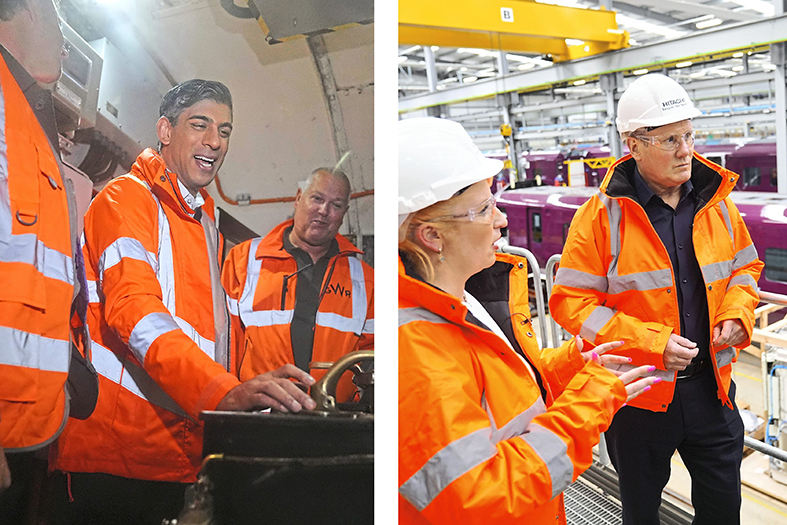
We’ve seen Rishi Sunak donning the hi-vis on the campaign trail and even experiencing an overnight Sleeper train to Devon, just a few weeks after Keir Starmer appeared in hi-vis at Hitachi’s Newton Aycliffe plant to launch his party’s plan for rail. Orange, it seems, is the new red, white and blue.

We’ve seen Rishi Sunak donning the hi-vis on the campaign trail and even experiencing an overnight Sleeper train to Devon, just a few weeks after Keir Starmer appeared in hi-vis at Hitachi’s Newton Aycliffe plant to launch his party’s plan for rail. Orange, it seems, is the new red, white and blue.
But it’s not all kissing babies, appearing in hard hats, or serving up fish and chips.
A General Election (July 4) does focus the mind, giving us some hope that our future leaders are genuinely trying to make our lives better.
The bad news is that change takes time, and there will be more widespread disruption while it all happens. Just remember that any big decision about our railways taken in 2024 might not return real benefits until 2034 or even 2044. In some cases, that’s nearly a generation to wait.
What rail passengers really want is cheaper (or at least consistent) fares, and clean trains with plenty of comfortable seats, that turn up and depart on time, and that are safe.
What freight operators want is to grow their business (and profits) by being able to run more services with greater efficiency. This doesn’t require much ideological thought.
Governments need to work out what’s affordable and balance the books. If what they do remains popular, they’ll get re-elected.
A scramble is now under way over which party will form the next government on July 4, and the future of transport should be much higher up the political agenda than it is. Of course, with so much unrest around the globe, we all accept that this is not possible.
If we’re to get a Labour government, as the polls seem to forecast, it will be interesting to see how quickly Great British Railways comes into being. Network Rail and others continue to stress that is dormant but not demised, and staff are on its payroll. Its headquarters office close to Derby station lies empty, just waiting for people to move in.
If Labour wins, who will incoming Prime Minister Sir Keir Starmer appoint as Transport Secretary? Louise Haigh has held the Shadow post since 2021, and (with a lot of help) has devised the party’s pre-election document - Getting Britain Moving: Labour’s Plan to Fix the Railways. It is worth a thorough read.
If the Conservatives remain in charge, a reshuffle at the top may be needed, because the incumbent Mark Harper is predicted to have a battle on his hands to hold on to his Dean Forest seat. In any case, his experience may be needed in another government department, to fill gaps created by the departure of other parliamentary colleagues.
Equally significantly, his popular second-in-command, Rail Minister Huw Merriman, has announced his decision to stand down as MP from his Battle and Bexhill seat in East Sussex. He will be much missed by the railway industry.
In the three weeks that remain before we go to the polls, RAIL readers are urged to challenge candidates of all parties on their transport policies, be it on the main line or urban transit.
How will private investment be encouraged? Will they work more closely with the new elected city mayors? And how will they restore industrial harmony?
There is a lot of good news around. Apart from disagreeing on how to go about it, both main political parties seem to agree on a lot of issues - as evidenced by Louise Haigh’s consistent (and complimentary) referral to the Williams-Shapps Plan for Rail.
Aside from the big parties, and the Green Party, RAIL’s analysis expresses disappointment at the lacklustre offerings from the Liberal Democrats and the Scottish National Party at the start of the 2024 campaign, while Reform UK seems radical beyond belief.
After 14 years under the Conservatives, we already have a platform for the kind of mega-billion investment that our forebears in British Rail could only dream of.
The naturally prudent Treasury may always be a barrier to free thinking, but it can be convinced of the need for change in the way it operates in partnership with the Department for Transport.
There is already a host of infrastructure schemes that we all hope will still go ahead. HS2 may not be getting a good press, and it is more of a ‘government railway’ than many of us might have chosen, but it is at least a rail improvement and now well under way. Some 134 miles of new line should open some time between 2029 and 2033, quite possibly into London Euston.
RAIL supports the creation of GBR, and is concerned that fares reform seems as far away as ever. Reviving old lines just isn’t happening, and there is still no construction pipeline for train builders, contractors, suppliers or investors.
Finally, we must all recognise that Labour is not actually promising any major upheaval, because it knows that radicalism results in instability. It is fully aware that there isn’t much money about for more capital projects, or for the political upheaval that legal firms relish.
Labour seems to talk endlessly about ‘nationalisation’, but it already has passenger operators in a vice-like grip. Perhaps it should find a new word to describe it.
‘Nationalisation’ had a different meaning back in 1948, when British Railways rescued the old companies from bankruptcy. It was part of a wide-ranging Labour policy that also embraced coal, steel, road transport, aviation, electricity, gas, and the Bank of England. Sadly, there was little money to invest in any of them.
We will soon be putting forward RAIL’s manifesto for the future of rail.
Sir Michael Holden, chairman of the editorial board of RAIL’s business quarterly, RailReview, outlines nine points he’d like to see a new government take on board in his own manifesto for rail. His round-up introduces RailReview's expert policy coverage ahead of the election on July 4th, which we will be publishing over the next few weeks. Watch this space. And of course we will have our regular columnists assess this government’s record, Labour’s plans, and how they have changed over the years. You can subscribe to read those now.
Let us know what policies you think the next government should embrace - or avoid. Please email [email protected].
Login to continue reading
Or register with RAIL to keep up-to-date with the latest news, insight and opinion.


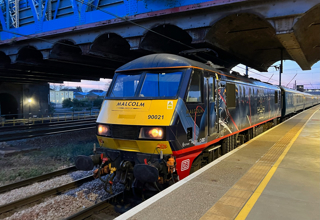
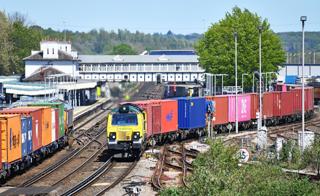
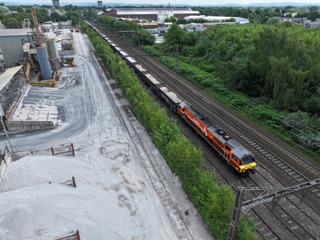
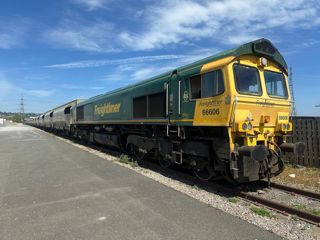
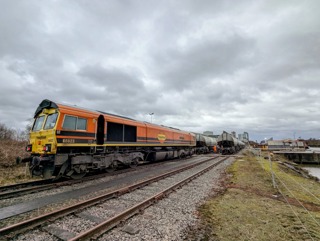










Login to comment
Comments
No comments have been made yet.